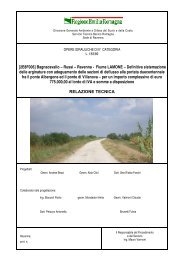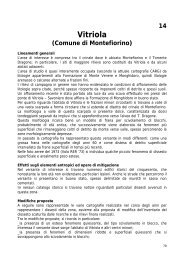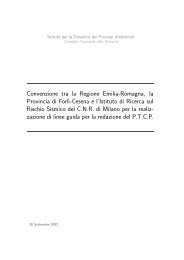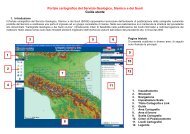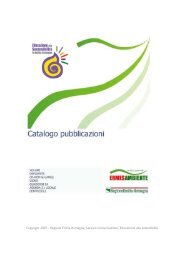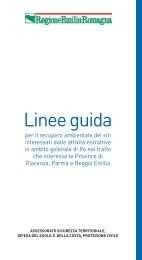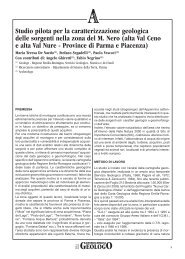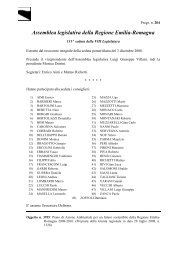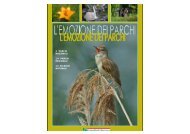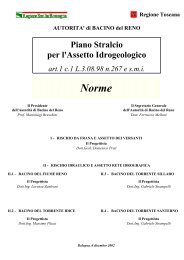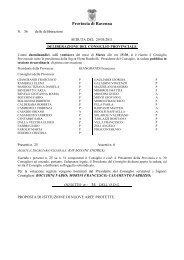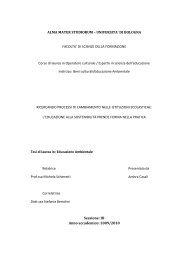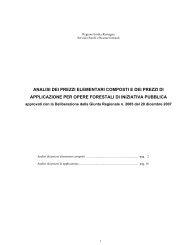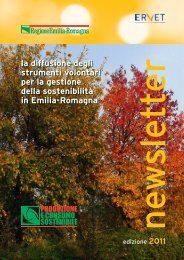air, water and soil quality qualité - ER Ambiente - Regione Emilia ...
air, water and soil quality qualité - ER Ambiente - Regione Emilia ...
air, water and soil quality qualité - ER Ambiente - Regione Emilia ...
You also want an ePaper? Increase the reach of your titles
YUMPU automatically turns print PDFs into web optimized ePapers that Google loves.
A third, radical, scenario, perhaps the most realistic of all, advances the hypothesis<br />
of a total dessication of Western <strong>and</strong> Eastern Large Aral Seas. In such a<br />
perspective, Aral Sea dried bottom salty deposits, now exposed to wind erosion <strong>and</strong><br />
potentially dangerous for human health, must be fixed through the seeding or the<br />
plantation of halophilic species (Khamzina et al. 2005). In the Amu-Darya delta,<br />
cotton fields residual <strong>water</strong>s could be used to flood small depressions, in order to<br />
transform them in fresh <strong>water</strong> artificial basins (KINDL<strong>ER</strong>, 1998). Regarding to this,<br />
a pilot-experience consists in Sudoche lake, located about 30 km South-West of<br />
Moynaq: thanks to a project funded by the World Bank, between 1998 <strong>and</strong> 2003 a<br />
new fresh <strong>water</strong> body was created (World Bank, 1998; Schlüter et al. 2007). Its<br />
area is about 10 km 2 ; the <strong>water</strong> volume about 2 km 3 . Sudoche lake holds strong<br />
natural values, because a massive wetl<strong>and</strong> birds frequentation has begun;<br />
moreover, <strong>water</strong> low salinity permitted the introduction of ichthyofauna <strong>and</strong>,<br />
thanks to this, the recovery of a small fishing industry (20-30 fishermen in May<br />
2007; C. Cencini, & S. Piastra, field research data). The Sudoche experience<br />
proves that, in the Amu-Darya delta, environmental restoration projects are<br />
technically feasible, ecologically useful <strong>and</strong> socially <strong>and</strong> economically effective.<br />
But, from the other h<strong>and</strong>, it must be considered the balance between costs <strong>and</strong><br />
benefits: the expensive budget needed for Sudoche lake (4 million USA $),<br />
demonstrates that this strategy cannot be extended on a large scale in the Amu-<br />
Darya delta (Piastra, 2008).<br />
Conclusions<br />
As previously analysed, beginning from the ’50s of the 20 th century the USSR<br />
encouraged in Central Asia the development of cotton cultivation, emphatically<br />
renamed the “White Gold”. In the Aral Sea Basin, <strong>water</strong> resources overexploitation<br />
caused an ecological disaster without any precedents in recent human<br />
history, cancelling a valuable l<strong>and</strong>scape which impressed, for example, Russian<br />
Admiral A.I. Boutakoff, the first to explore this region in the 19 th century (Piastra,<br />
on press). In the case of the Aral Sea, the decreases of level, area <strong>and</strong> volume<br />
created a splitting in three different <strong>water</strong> bodies: the Small Aral, the Western<br />
Large Aral <strong>and</strong> the Eastern Large Aral. The first, entirely located in Kazakhstan, at<br />
now seems to have entered a sustainable strategy about <strong>water</strong> resources; the second<br />
<strong>and</strong> the third, located on the boundary between Kazakhstan <strong>and</strong> Uzbekistan, show<br />
critical conditions.<br />
The international scientific community promoted several appeals to extend to the<br />
Aral Sea the status of UNESCO World Heritage (Glantz, Figueroa, 1997) <strong>and</strong> to<br />
save its Biodiversity (IUCN, 2004), but without any practical results. The key to<br />
solve radically the Aral Sea Crisis is economical <strong>and</strong> political, <strong>and</strong> it is related to<br />
decrease drasticly the irrigated area in the basin; but such a program should involve<br />
a total re-organization of agriculture, nowadays based on cotton, which Central<br />
Asian Republics, except for Kazakhstan, cannot afford. Moreover, Central Asian<br />
leaders have no interest to take unpopular <strong>and</strong> uneconomical decisions in a short<br />
<br />
59



